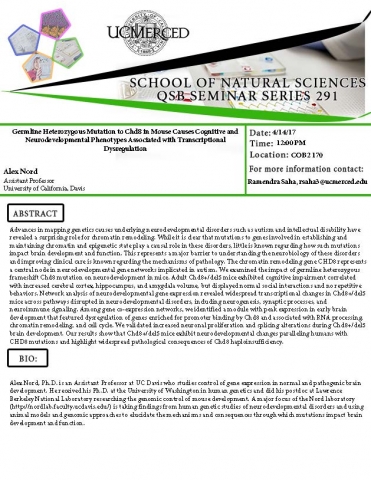Alex Nord, University of California, Davis
Abstract:
Advances in mapping genetics causes underlying neurodevelopmental disorders such as autism and intellectual disability have revealed a surprising role for chromatin remodeling. While it is clear that mutations to genes involved in establishing and maintaining chromatin and epigenetic state play a causal role in these disorders, little is known regarding how such mutations impact brain development and function. This represents a major barrier to understanding the neurobiology of these disorders and improving clinical care is known regarding the mechanisms of pathology. The chromatin remodeling gene CHD8 represents a central node in neurodevelopmental gene networks implicated in autism. We examined the impact of germline heterozygous frameshift Chd8 mutation on neurodevelopment in mice. Adult Chd8+/del5 mice exhibited cognitive impairment correlated with increased cerebral cortex, hippocampus, and amygdala volume, but displayed normal social interactions and no repetitive behaviors. Network analysis of neurodevelopmental gene expression revealed widespread transcriptional changes in Chd8+/del5 mice across pathways disrupted in neurodevelopmental disorders, including neurogenesis, synaptic processes, and neuroimmune signaling. Among gene co-expression networks, we identified a module with peak expression in early brain development that featured dysregulation of genes enriched for promoter binding by Chd8 and associated with RNA processing, chromatin remodeling, and cell cycle. We validated increased neuronal proliferation and splicing alterations during Chd8+/del5 brain development. Our results show that Chd8+/del5 mice exhibit neurodevelopmental changes paralleling humans with CHD8 mutations and highlight widespread pathological consequences of Chd8 haploinsufficiency.




